Management Accounting Report on Unilever's Financial Performance
VerifiedAdded on 2021/08/03
|27
|7364
|484
Report
AI Summary
This report, prepared for a BTEC Business unit on Management Accounting, provides a comprehensive analysis of Unilever's accounting practices. It begins with an introduction to the company and definitions of management accounting, including its role and principles, distinguishing it from financial accounting. The report then delves into Unilever's management accounting systems, specifically job costing and inventory management. It further examines management accounting reporting, including cost of production and sales reports, along with the methods used in creating these reports. Finally, the report analyzes Unilever's financial statements, including the balance sheet, cash flow statement, and income statement, along with an analysis of fundamental ratios. The report aims to provide a detailed overview of Unilever's financial performance and accounting strategies.
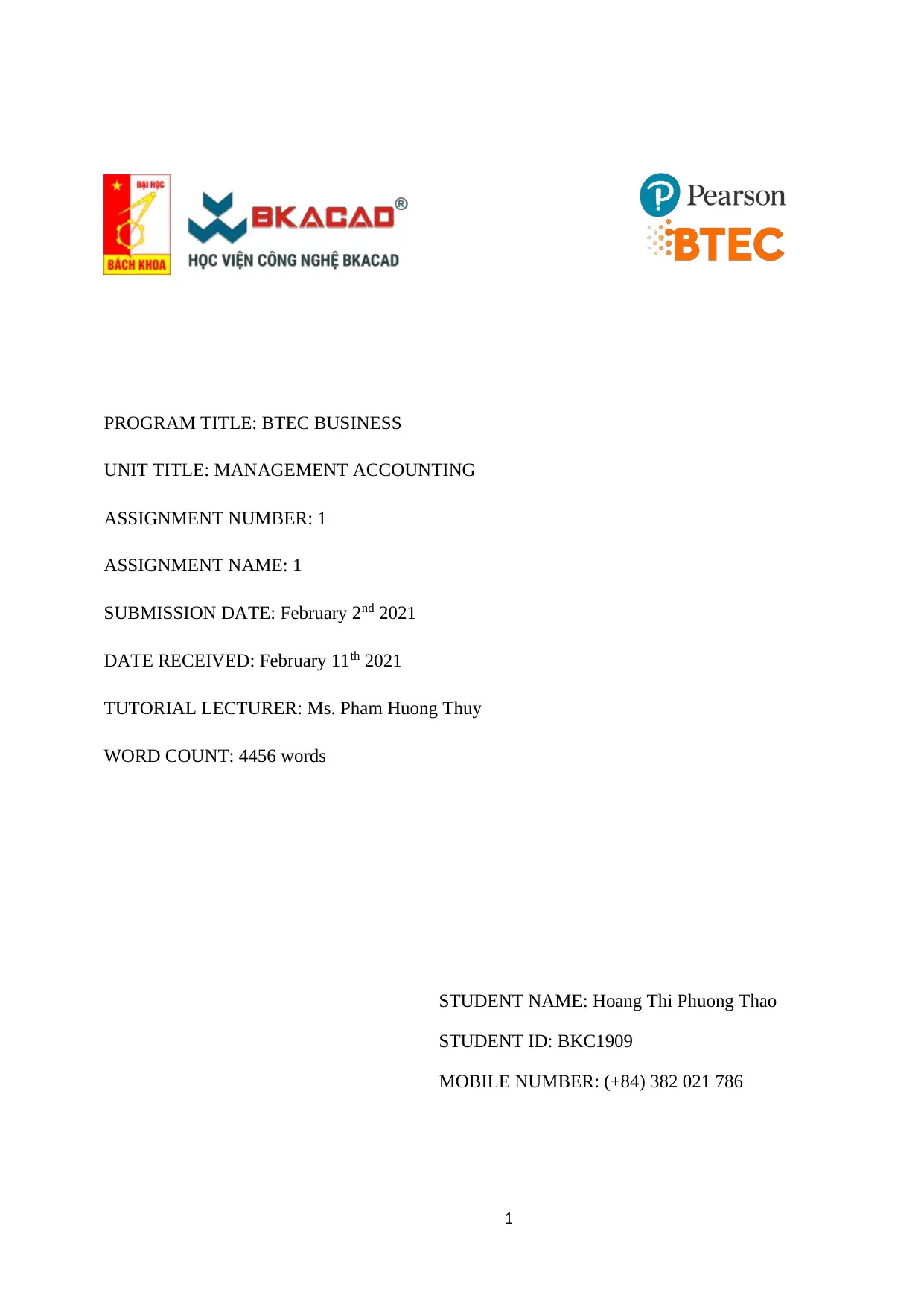
1
PROGRAM TITLE: BTEC BUSINESS
UNIT TITLE: MANAGEMENT ACCOUNTING
ASSIGNMENT NUMBER: 1
ASSIGNMENT NAME: 1
SUBMISSION DATE: February 2nd 2021
DATE RECEIVED: February 11th 2021
TUTORIAL LECTURER: Ms. Pham Huong Thuy
WORD COUNT: 4456 words
STUDENT NAME: Hoang Thi Phuong Thao
STUDENT ID: BKC1909
MOBILE NUMBER: (+84) 382 021 786
PROGRAM TITLE: BTEC BUSINESS
UNIT TITLE: MANAGEMENT ACCOUNTING
ASSIGNMENT NUMBER: 1
ASSIGNMENT NAME: 1
SUBMISSION DATE: February 2nd 2021
DATE RECEIVED: February 11th 2021
TUTORIAL LECTURER: Ms. Pham Huong Thuy
WORD COUNT: 4456 words
STUDENT NAME: Hoang Thi Phuong Thao
STUDENT ID: BKC1909
MOBILE NUMBER: (+84) 382 021 786
Paraphrase This Document
Need a fresh take? Get an instant paraphrase of this document with our AI Paraphraser
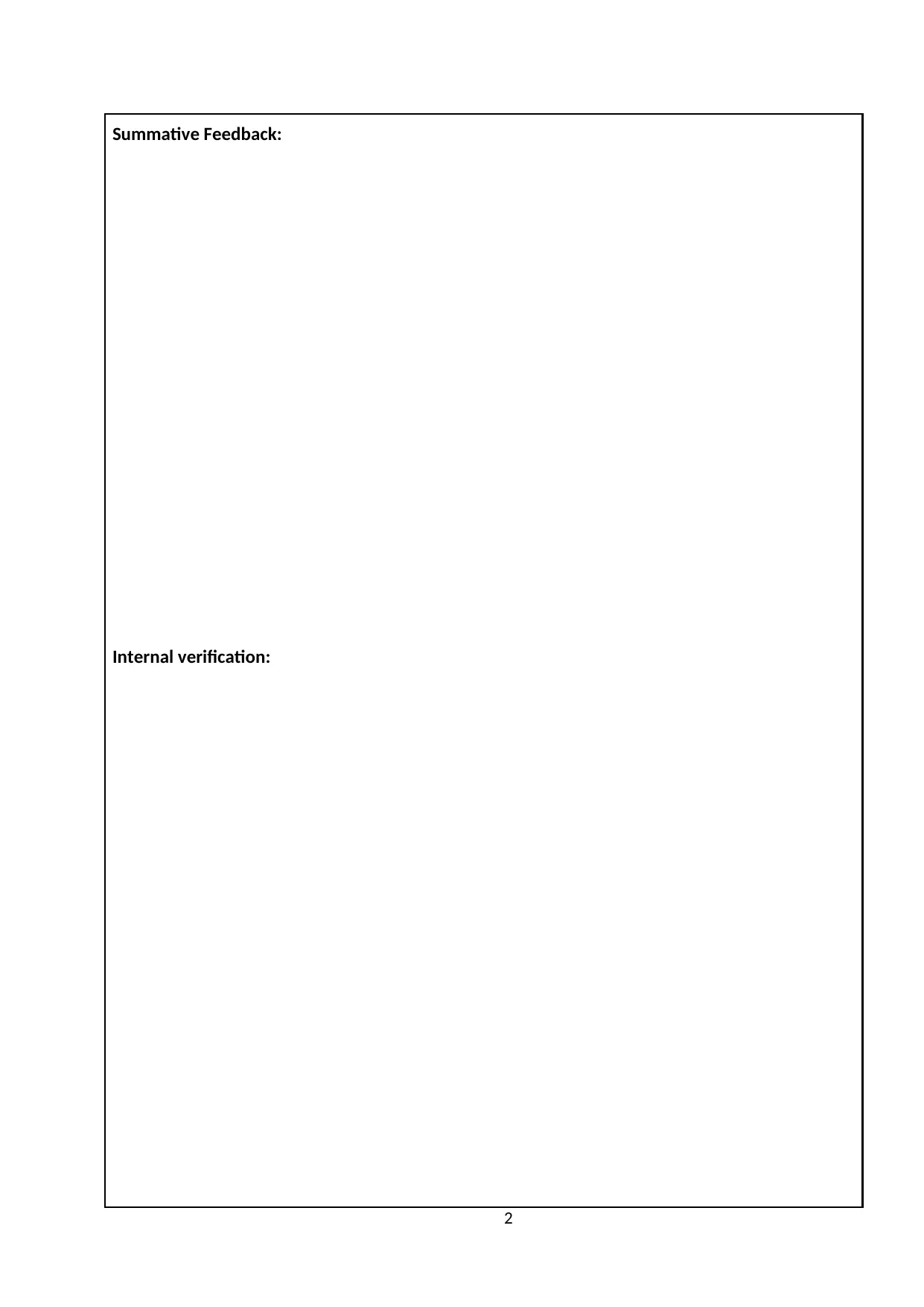
2
Summative Feedback:
Internal verification:
Summative Feedback:
Internal verification:
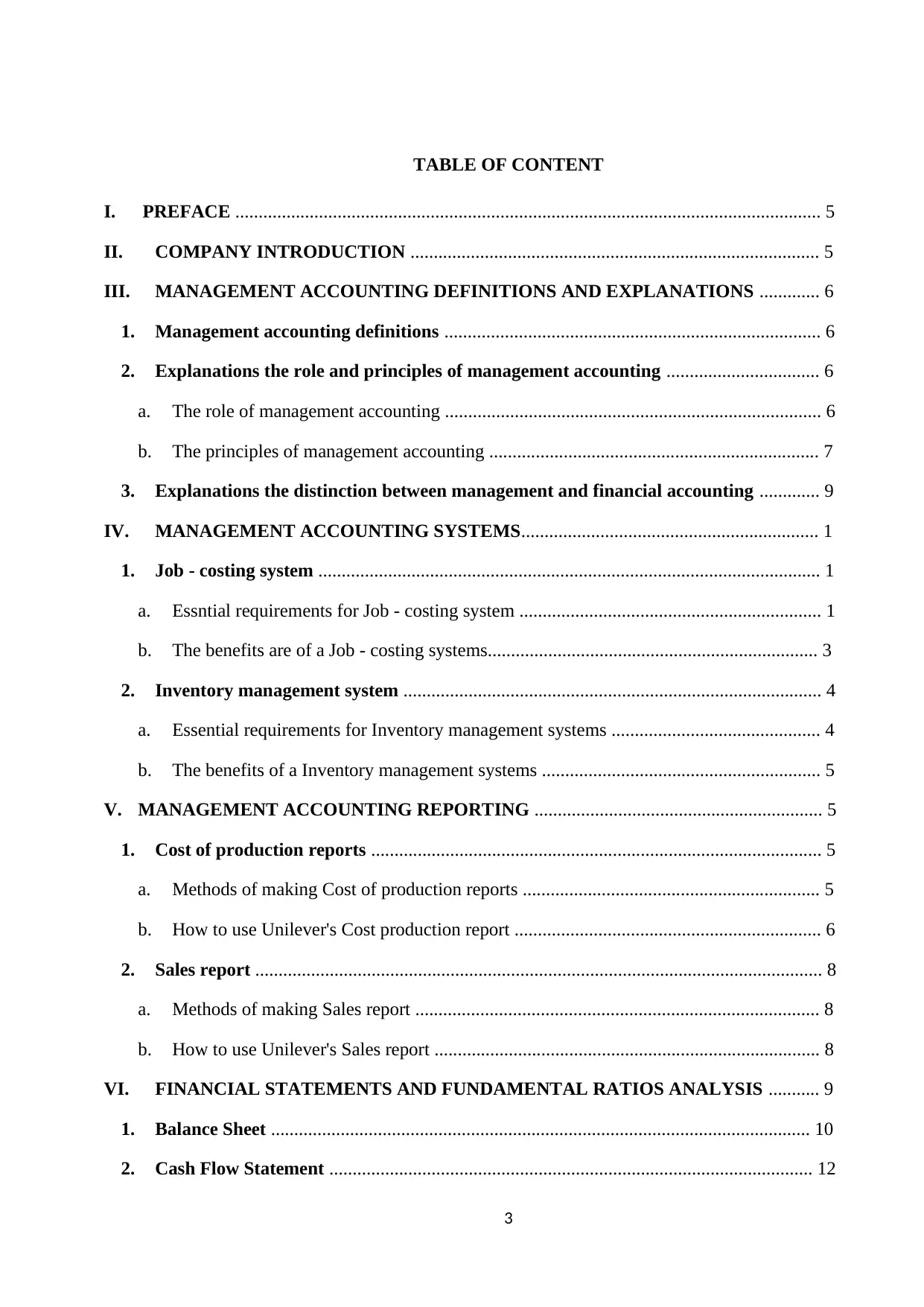
3
TABLE OF CONTENT
I. PREFACE .............................................................................................................................. 5
II. COMPANY INTRODUCTION ........................................................................................ 5
III. MANAGEMENT ACCOUNTING DEFINITIONS AND EXPLANATIONS ............. 6
1. Management accounting definitions ................................................................................. 6
2. Explanations the role and principles of management accounting ................................. 6
a. The role of management accounting ................................................................................. 6
b. The principles of management accounting ....................................................................... 7
3. Explanations the distinction between management and financial accounting ............. 9
IV. MANAGEMENT ACCOUNTING SYSTEMS................................................................ 1
1. Job - costing system ............................................................................................................ 1
a. Essntial requirements for Job - costing system ................................................................. 1
b. The benefits are of a Job - costing systems....................................................................... 3
2. Inventory management system .......................................................................................... 4
a. Essential requirements for Inventory management systems ............................................. 4
b. The benefits of a Inventory management systems ............................................................ 5
V. MANAGEMENT ACCOUNTING REPORTING .............................................................. 5
1. Cost of production reports ................................................................................................. 5
a. Methods of making Cost of production reports ................................................................ 5
b. How to use Unilever's Cost production report .................................................................. 6
2. Sales report .......................................................................................................................... 8
a. Methods of making Sales report ....................................................................................... 8
b. How to use Unilever's Sales report ................................................................................... 8
VI. FINANCIAL STATEMENTS AND FUNDAMENTAL RATIOS ANALYSIS ........... 9
1. Balance Sheet .................................................................................................................... 10
2. Cash Flow Statement ........................................................................................................ 12
TABLE OF CONTENT
I. PREFACE .............................................................................................................................. 5
II. COMPANY INTRODUCTION ........................................................................................ 5
III. MANAGEMENT ACCOUNTING DEFINITIONS AND EXPLANATIONS ............. 6
1. Management accounting definitions ................................................................................. 6
2. Explanations the role and principles of management accounting ................................. 6
a. The role of management accounting ................................................................................. 6
b. The principles of management accounting ....................................................................... 7
3. Explanations the distinction between management and financial accounting ............. 9
IV. MANAGEMENT ACCOUNTING SYSTEMS................................................................ 1
1. Job - costing system ............................................................................................................ 1
a. Essntial requirements for Job - costing system ................................................................. 1
b. The benefits are of a Job - costing systems....................................................................... 3
2. Inventory management system .......................................................................................... 4
a. Essential requirements for Inventory management systems ............................................. 4
b. The benefits of a Inventory management systems ............................................................ 5
V. MANAGEMENT ACCOUNTING REPORTING .............................................................. 5
1. Cost of production reports ................................................................................................. 5
a. Methods of making Cost of production reports ................................................................ 5
b. How to use Unilever's Cost production report .................................................................. 6
2. Sales report .......................................................................................................................... 8
a. Methods of making Sales report ....................................................................................... 8
b. How to use Unilever's Sales report ................................................................................... 8
VI. FINANCIAL STATEMENTS AND FUNDAMENTAL RATIOS ANALYSIS ........... 9
1. Balance Sheet .................................................................................................................... 10
2. Cash Flow Statement ........................................................................................................ 12
⊘ This is a preview!⊘
Do you want full access?
Subscribe today to unlock all pages.

Trusted by 1+ million students worldwide
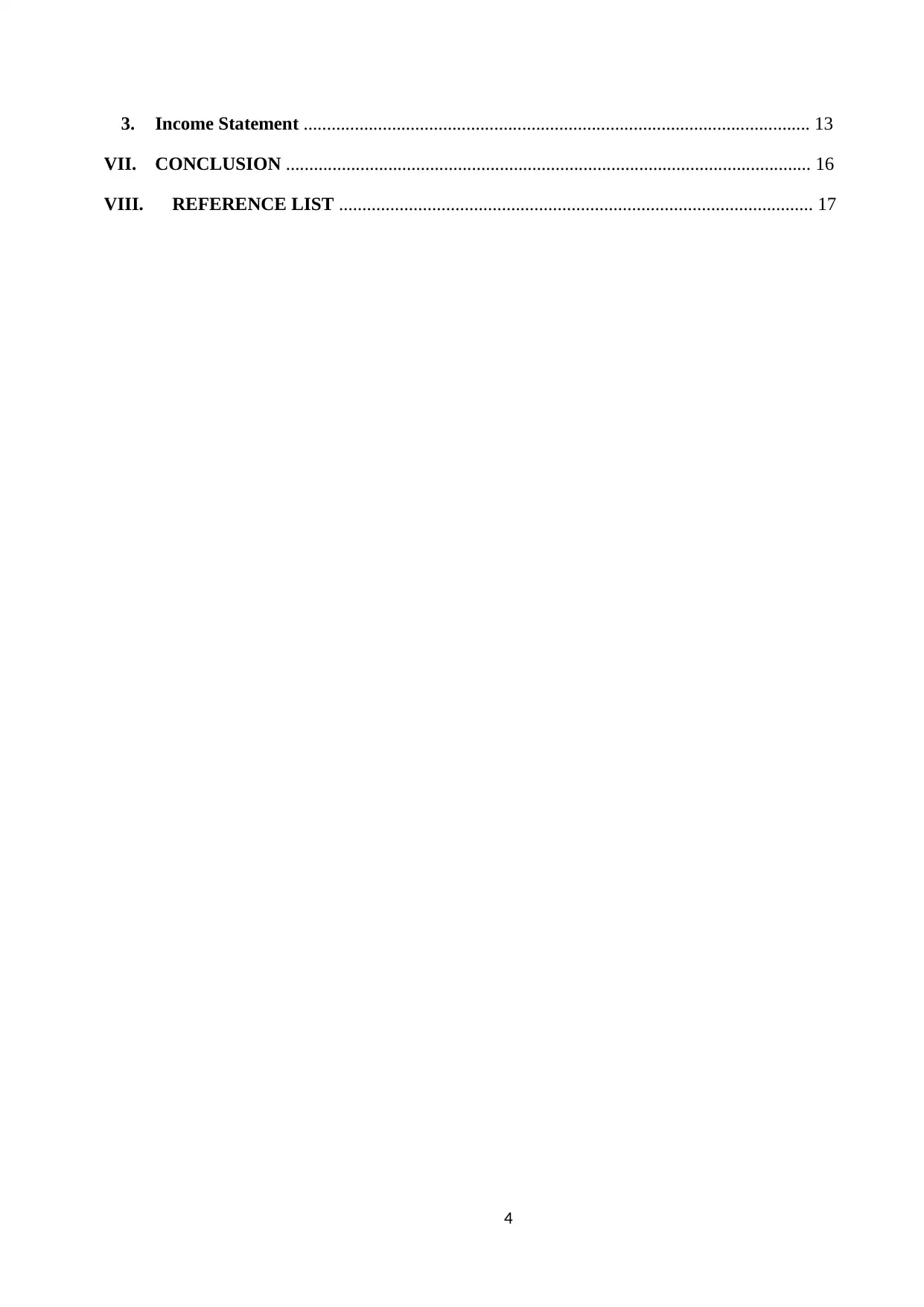
4
3. Income Statement ............................................................................................................. 13
VII. CONCLUSION ................................................................................................................. 16
VIII. REFERENCE LIST ...................................................................................................... 17
3. Income Statement ............................................................................................................. 13
VII. CONCLUSION ................................................................................................................. 16
VIII. REFERENCE LIST ...................................................................................................... 17
Paraphrase This Document
Need a fresh take? Get an instant paraphrase of this document with our AI Paraphraser
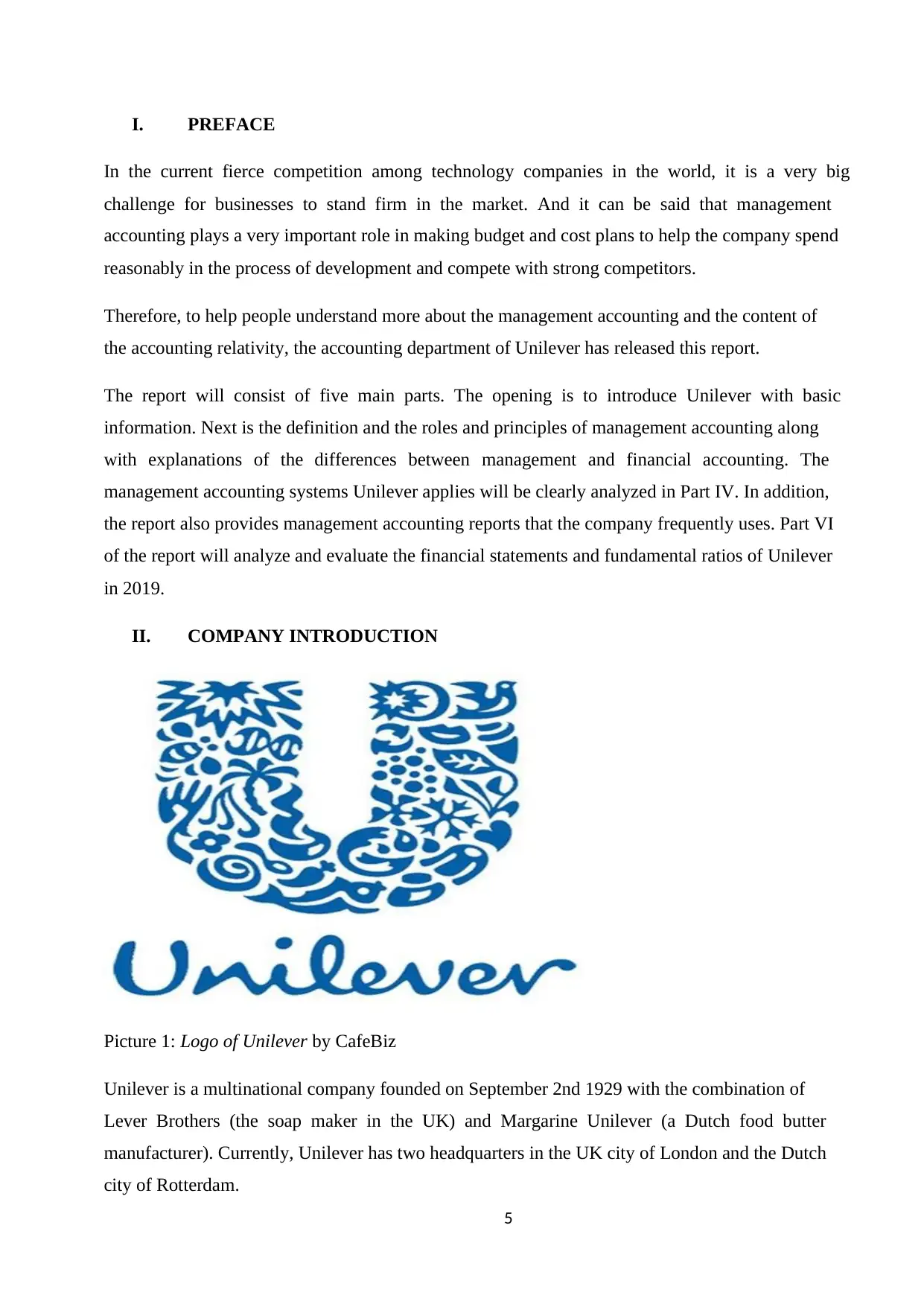
5
I. PREFACE
In the current fierce competition among technology companies in the world, it is a very big
challenge for businesses to stand firm in the market. And it can be said that management
accounting plays a very important role in making budget and cost plans to help the company spend
reasonably in the process of development and compete with strong competitors.
Therefore, to help people understand more about the management accounting and the content of
the accounting relativity, the accounting department of Unilever has released this report.
The report will consist of five main parts. The opening is to introduce Unilever with basic
information. Next is the definition and the roles and principles of management accounting along
with explanations of the differences between management and financial accounting. The
management accounting systems Unilever applies will be clearly analyzed in Part IV. In addition,
the report also provides management accounting reports that the company frequently uses. Part VI
of the report will analyze and evaluate the financial statements and fundamental ratios of Unilever
in 2019.
II. COMPANY INTRODUCTION
Picture 1: Logo of Unilever by CafeBiz
Unilever is a multinational company founded on September 2nd 1929 with the combination of
Lever Brothers (the soap maker in the UK) and Margarine Unilever (a Dutch food butter
manufacturer). Currently, Unilever has two headquarters in the UK city of London and the Dutch
city of Rotterdam.
I. PREFACE
In the current fierce competition among technology companies in the world, it is a very big
challenge for businesses to stand firm in the market. And it can be said that management
accounting plays a very important role in making budget and cost plans to help the company spend
reasonably in the process of development and compete with strong competitors.
Therefore, to help people understand more about the management accounting and the content of
the accounting relativity, the accounting department of Unilever has released this report.
The report will consist of five main parts. The opening is to introduce Unilever with basic
information. Next is the definition and the roles and principles of management accounting along
with explanations of the differences between management and financial accounting. The
management accounting systems Unilever applies will be clearly analyzed in Part IV. In addition,
the report also provides management accounting reports that the company frequently uses. Part VI
of the report will analyze and evaluate the financial statements and fundamental ratios of Unilever
in 2019.
II. COMPANY INTRODUCTION
Picture 1: Logo of Unilever by CafeBiz
Unilever is a multinational company founded on September 2nd 1929 with the combination of
Lever Brothers (the soap maker in the UK) and Margarine Unilever (a Dutch food butter
manufacturer). Currently, Unilever has two headquarters in the UK city of London and the Dutch
city of Rotterdam.
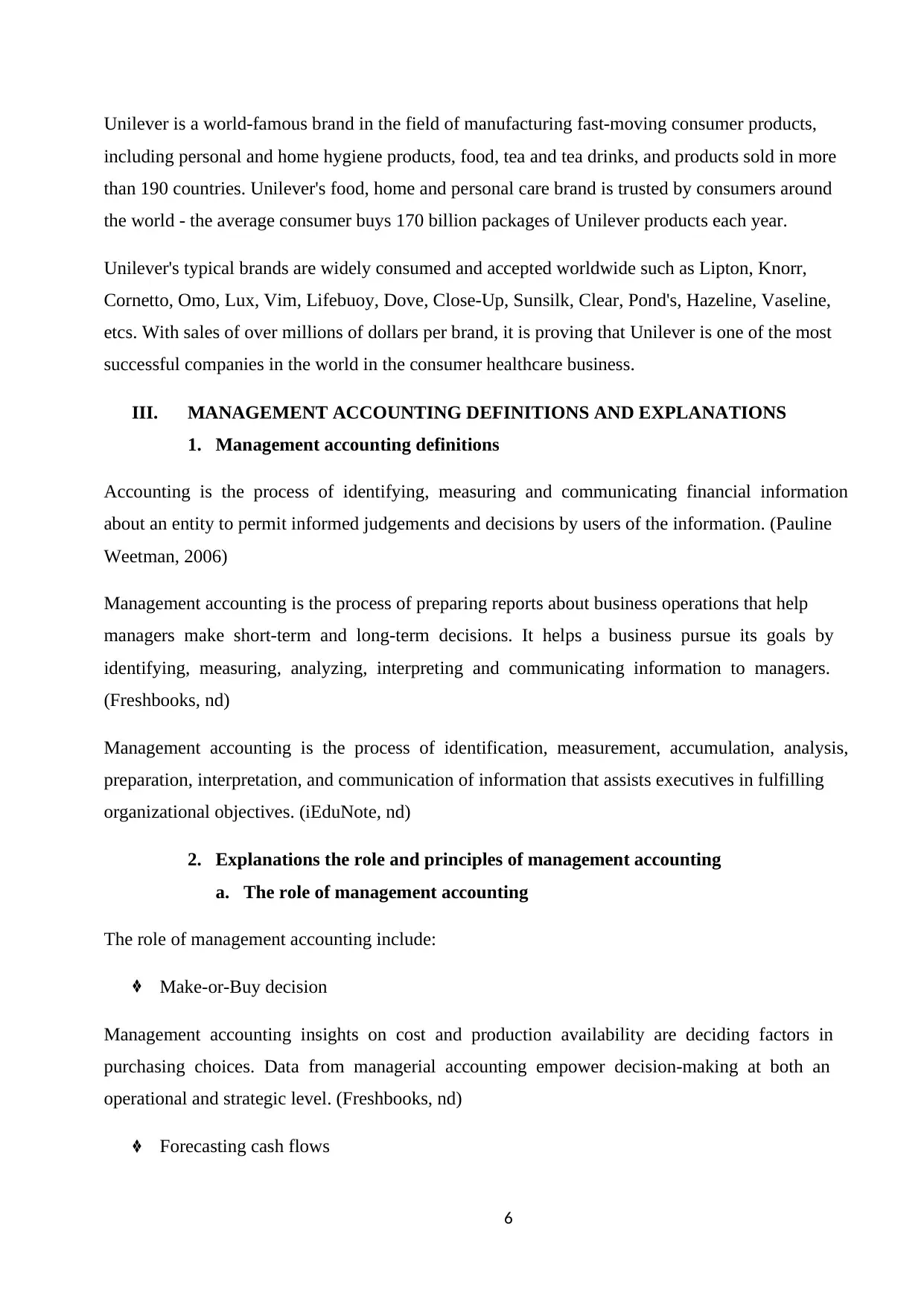
6
Unilever is a world-famous brand in the field of manufacturing fast-moving consumer products,
including personal and home hygiene products, food, tea and tea drinks, and products sold in more
than 190 countries. Unilever's food, home and personal care brand is trusted by consumers around
the world - the average consumer buys 170 billion packages of Unilever products each year.
Unilever's typical brands are widely consumed and accepted worldwide such as Lipton, Knorr,
Cornetto, Omo, Lux, Vim, Lifebuoy, Dove, Close-Up, Sunsilk, Clear, Pond's, Hazeline, Vaseline,
etcs. With sales of over millions of dollars per brand, it is proving that Unilever is one of the most
successful companies in the world in the consumer healthcare business.
III. MANAGEMENT ACCOUNTING DEFINITIONS AND EXPLANATIONS
1. Management accounting definitions
Accounting is the process of identifying, measuring and communicating financial information
about an entity to permit informed judgements and decisions by users of the information. (Pauline
Weetman, 2006)
Management accounting is the process of preparing reports about business operations that help
managers make short-term and long-term decisions. It helps a business pursue its goals by
identifying, measuring, analyzing, interpreting and communicating information to managers.
(Freshbooks, nd)
Management accounting is the process of identification, measurement, accumulation, analysis,
preparation, interpretation, and communication of information that assists executives in fulfilling
organizational objectives. (iEduNote, nd)
2. Explanations the role and principles of management accounting
a. The role of management accounting
The role of management accounting include:
❖ Make-or-Buy decision
Management accounting insights on cost and production availability are deciding factors in
purchasing choices. Data from managerial accounting empower decision-making at both an
operational and strategic level. (Freshbooks, nd)
❖ Forecasting cash flows
Unilever is a world-famous brand in the field of manufacturing fast-moving consumer products,
including personal and home hygiene products, food, tea and tea drinks, and products sold in more
than 190 countries. Unilever's food, home and personal care brand is trusted by consumers around
the world - the average consumer buys 170 billion packages of Unilever products each year.
Unilever's typical brands are widely consumed and accepted worldwide such as Lipton, Knorr,
Cornetto, Omo, Lux, Vim, Lifebuoy, Dove, Close-Up, Sunsilk, Clear, Pond's, Hazeline, Vaseline,
etcs. With sales of over millions of dollars per brand, it is proving that Unilever is one of the most
successful companies in the world in the consumer healthcare business.
III. MANAGEMENT ACCOUNTING DEFINITIONS AND EXPLANATIONS
1. Management accounting definitions
Accounting is the process of identifying, measuring and communicating financial information
about an entity to permit informed judgements and decisions by users of the information. (Pauline
Weetman, 2006)
Management accounting is the process of preparing reports about business operations that help
managers make short-term and long-term decisions. It helps a business pursue its goals by
identifying, measuring, analyzing, interpreting and communicating information to managers.
(Freshbooks, nd)
Management accounting is the process of identification, measurement, accumulation, analysis,
preparation, interpretation, and communication of information that assists executives in fulfilling
organizational objectives. (iEduNote, nd)
2. Explanations the role and principles of management accounting
a. The role of management accounting
The role of management accounting include:
❖ Make-or-Buy decision
Management accounting insights on cost and production availability are deciding factors in
purchasing choices. Data from managerial accounting empower decision-making at both an
operational and strategic level. (Freshbooks, nd)
❖ Forecasting cash flows
⊘ This is a preview!⊘
Do you want full access?
Subscribe today to unlock all pages.

Trusted by 1+ million students worldwide
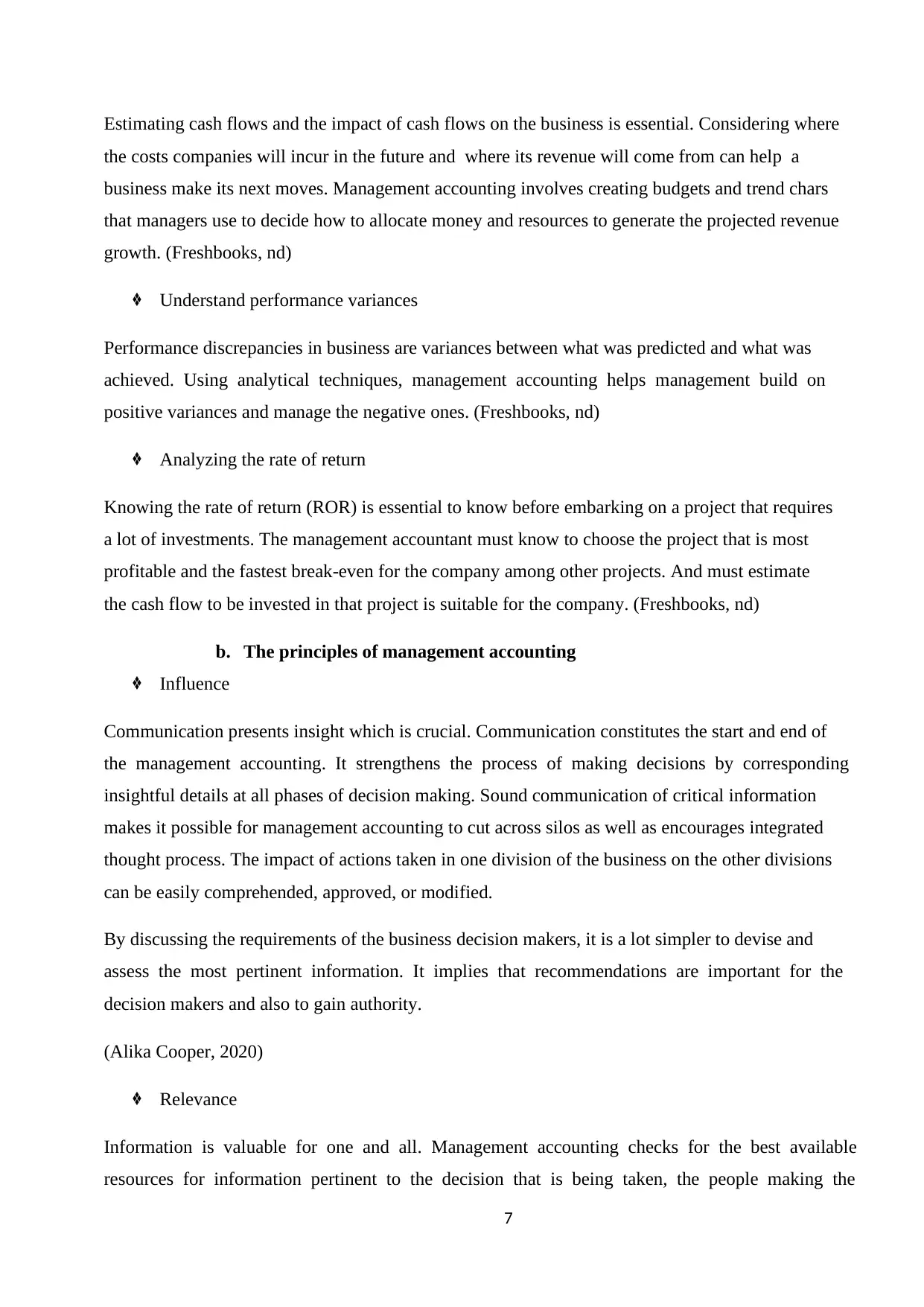
7
Estimating cash flows and the impact of cash flows on the business is essential. Considering where
the costs companies will incur in the future and where its revenue will come from can help a
business make its next moves. Management accounting involves creating budgets and trend chars
that managers use to decide how to allocate money and resources to generate the projected revenue
growth. (Freshbooks, nd)
❖ Understand performance variances
Performance discrepancies in business are variances between what was predicted and what was
achieved. Using analytical techniques, management accounting helps management build on
positive variances and manage the negative ones. (Freshbooks, nd)
❖ Analyzing the rate of return
Knowing the rate of return (ROR) is essential to know before embarking on a project that requires
a lot of investments. The management accountant must know to choose the project that is most
profitable and the fastest break-even for the company among other projects. And must estimate
the cash flow to be invested in that project is suitable for the company. (Freshbooks, nd)
b. The principles of management accounting
❖ Influence
Communication presents insight which is crucial. Communication constitutes the start and end of
the management accounting. It strengthens the process of making decisions by corresponding
insightful details at all phases of decision making. Sound communication of critical information
makes it possible for management accounting to cut across silos as well as encourages integrated
thought process. The impact of actions taken in one division of the business on the other divisions
can be easily comprehended, approved, or modified.
By discussing the requirements of the business decision makers, it is a lot simpler to devise and
assess the most pertinent information. It implies that recommendations are important for the
decision makers and also to gain authority.
(Alika Cooper, 2020)
❖ Relevance
Information is valuable for one and all. Management accounting checks for the best available
resources for information pertinent to the decision that is being taken, the people making the
Estimating cash flows and the impact of cash flows on the business is essential. Considering where
the costs companies will incur in the future and where its revenue will come from can help a
business make its next moves. Management accounting involves creating budgets and trend chars
that managers use to decide how to allocate money and resources to generate the projected revenue
growth. (Freshbooks, nd)
❖ Understand performance variances
Performance discrepancies in business are variances between what was predicted and what was
achieved. Using analytical techniques, management accounting helps management build on
positive variances and manage the negative ones. (Freshbooks, nd)
❖ Analyzing the rate of return
Knowing the rate of return (ROR) is essential to know before embarking on a project that requires
a lot of investments. The management accountant must know to choose the project that is most
profitable and the fastest break-even for the company among other projects. And must estimate
the cash flow to be invested in that project is suitable for the company. (Freshbooks, nd)
b. The principles of management accounting
❖ Influence
Communication presents insight which is crucial. Communication constitutes the start and end of
the management accounting. It strengthens the process of making decisions by corresponding
insightful details at all phases of decision making. Sound communication of critical information
makes it possible for management accounting to cut across silos as well as encourages integrated
thought process. The impact of actions taken in one division of the business on the other divisions
can be easily comprehended, approved, or modified.
By discussing the requirements of the business decision makers, it is a lot simpler to devise and
assess the most pertinent information. It implies that recommendations are important for the
decision makers and also to gain authority.
(Alika Cooper, 2020)
❖ Relevance
Information is valuable for one and all. Management accounting checks for the best available
resources for information pertinent to the decision that is being taken, the people making the
Paraphrase This Document
Need a fresh take? Get an instant paraphrase of this document with our AI Paraphraser
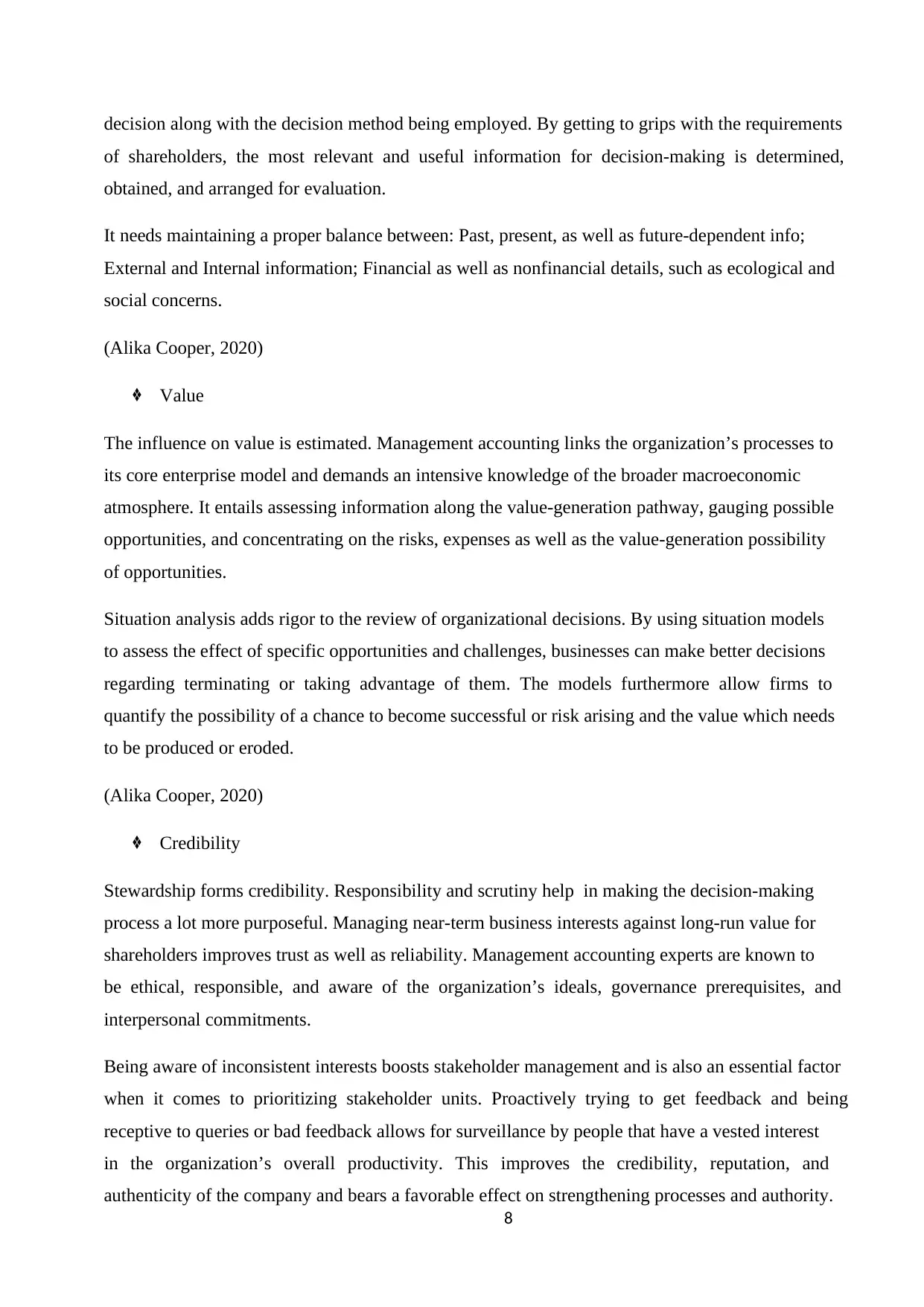
8
decision along with the decision method being employed. By getting to grips with the requirements
of shareholders, the most relevant and useful information for decision-making is determined,
obtained, and arranged for evaluation.
It needs maintaining a proper balance between: Past, present, as well as future-dependent info;
External and Internal information; Financial as well as nonfinancial details, such as ecological and
social concerns.
(Alika Cooper, 2020)
❖ Value
The influence on value is estimated. Management accounting links the organization’s processes to
its core enterprise model and demands an intensive knowledge of the broader macroeconomic
atmosphere. It entails assessing information along the value-generation pathway, gauging possible
opportunities, and concentrating on the risks, expenses as well as the value-generation possibility
of opportunities.
Situation analysis adds rigor to the review of organizational decisions. By using situation models
to assess the effect of specific opportunities and challenges, businesses can make better decisions
regarding terminating or taking advantage of them. The models furthermore allow firms to
quantify the possibility of a chance to become successful or risk arising and the value which needs
to be produced or eroded.
(Alika Cooper, 2020)
❖ Credibility
Stewardship forms credibility. Responsibility and scrutiny help in making the decision-making
process a lot more purposeful. Managing near-term business interests against long-run value for
shareholders improves trust as well as reliability. Management accounting experts are known to
be ethical, responsible, and aware of the organization’s ideals, governance prerequisites, and
interpersonal commitments.
Being aware of inconsistent interests boosts stakeholder management and is also an essential factor
when it comes to prioritizing stakeholder units. Proactively trying to get feedback and being
receptive to queries or bad feedback allows for surveillance by people that have a vested interest
in the organization’s overall productivity. This improves the credibility, reputation, and
authenticity of the company and bears a favorable effect on strengthening processes and authority.
decision along with the decision method being employed. By getting to grips with the requirements
of shareholders, the most relevant and useful information for decision-making is determined,
obtained, and arranged for evaluation.
It needs maintaining a proper balance between: Past, present, as well as future-dependent info;
External and Internal information; Financial as well as nonfinancial details, such as ecological and
social concerns.
(Alika Cooper, 2020)
❖ Value
The influence on value is estimated. Management accounting links the organization’s processes to
its core enterprise model and demands an intensive knowledge of the broader macroeconomic
atmosphere. It entails assessing information along the value-generation pathway, gauging possible
opportunities, and concentrating on the risks, expenses as well as the value-generation possibility
of opportunities.
Situation analysis adds rigor to the review of organizational decisions. By using situation models
to assess the effect of specific opportunities and challenges, businesses can make better decisions
regarding terminating or taking advantage of them. The models furthermore allow firms to
quantify the possibility of a chance to become successful or risk arising and the value which needs
to be produced or eroded.
(Alika Cooper, 2020)
❖ Credibility
Stewardship forms credibility. Responsibility and scrutiny help in making the decision-making
process a lot more purposeful. Managing near-term business interests against long-run value for
shareholders improves trust as well as reliability. Management accounting experts are known to
be ethical, responsible, and aware of the organization’s ideals, governance prerequisites, and
interpersonal commitments.
Being aware of inconsistent interests boosts stakeholder management and is also an essential factor
when it comes to prioritizing stakeholder units. Proactively trying to get feedback and being
receptive to queries or bad feedback allows for surveillance by people that have a vested interest
in the organization’s overall productivity. This improves the credibility, reputation, and
authenticity of the company and bears a favorable effect on strengthening processes and authority.
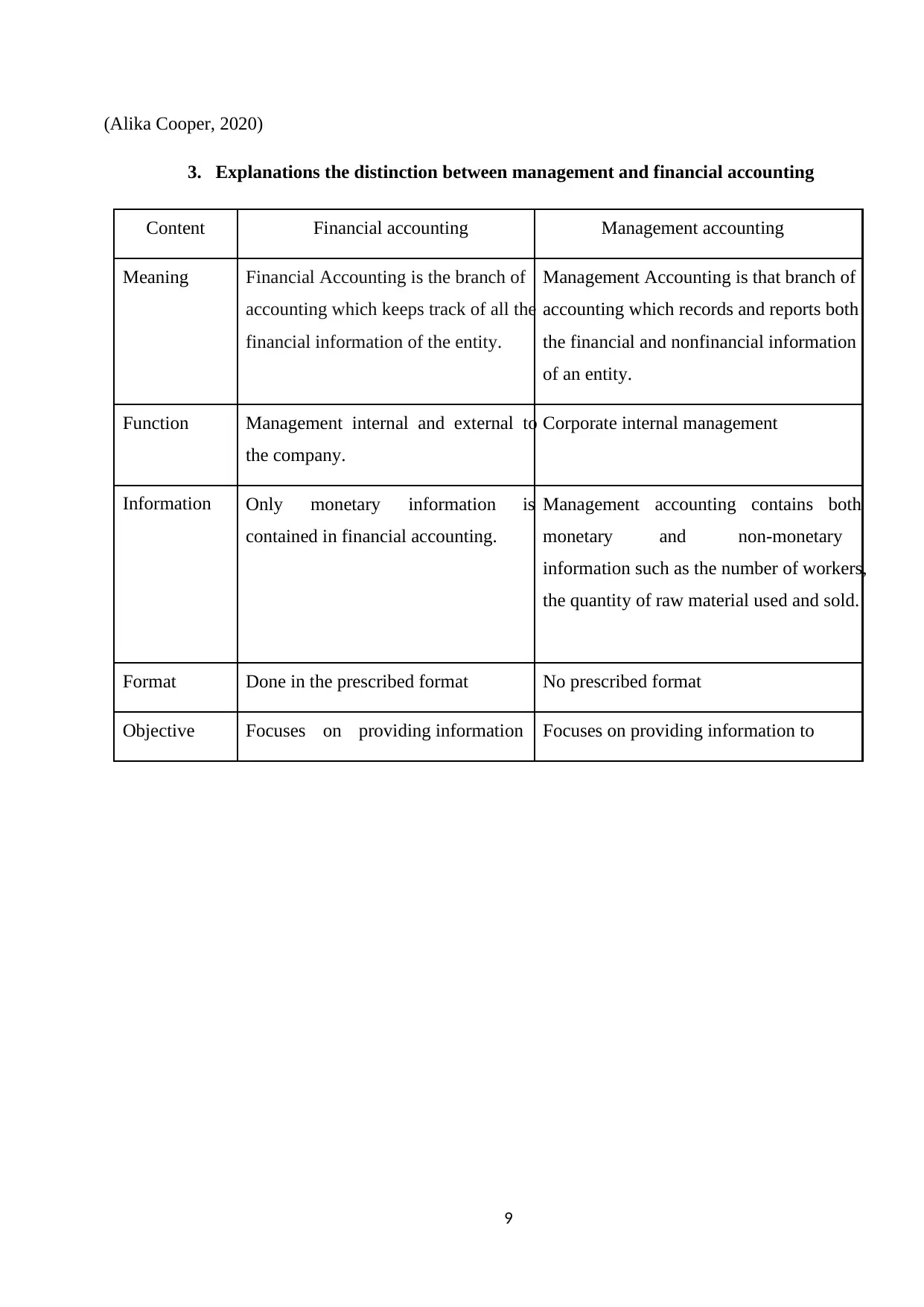
9
(Alika Cooper, 2020)
3. Explanations the distinction between management and financial accounting
Content Financial accounting Management accounting
Meaning Financial Accounting is the branch of
accounting which keeps track of all the
financial information of the entity.
Management Accounting is that branch of
accounting which records and reports both
the financial and nonfinancial information
of an entity.
Function Management internal and external to
the company.
Corporate internal management
Information Only monetary information is
contained in financial accounting.
Management accounting contains both
monetary and non-monetary
information such as the number of workers,
the quantity of raw material used and sold.
Format Done in the prescribed format No prescribed format
Objective Focuses on providing information Focuses on providing information to
(Alika Cooper, 2020)
3. Explanations the distinction between management and financial accounting
Content Financial accounting Management accounting
Meaning Financial Accounting is the branch of
accounting which keeps track of all the
financial information of the entity.
Management Accounting is that branch of
accounting which records and reports both
the financial and nonfinancial information
of an entity.
Function Management internal and external to
the company.
Corporate internal management
Information Only monetary information is
contained in financial accounting.
Management accounting contains both
monetary and non-monetary
information such as the number of workers,
the quantity of raw material used and sold.
Format Done in the prescribed format No prescribed format
Objective Focuses on providing information Focuses on providing information to
⊘ This is a preview!⊘
Do you want full access?
Subscribe today to unlock all pages.

Trusted by 1+ million students worldwide
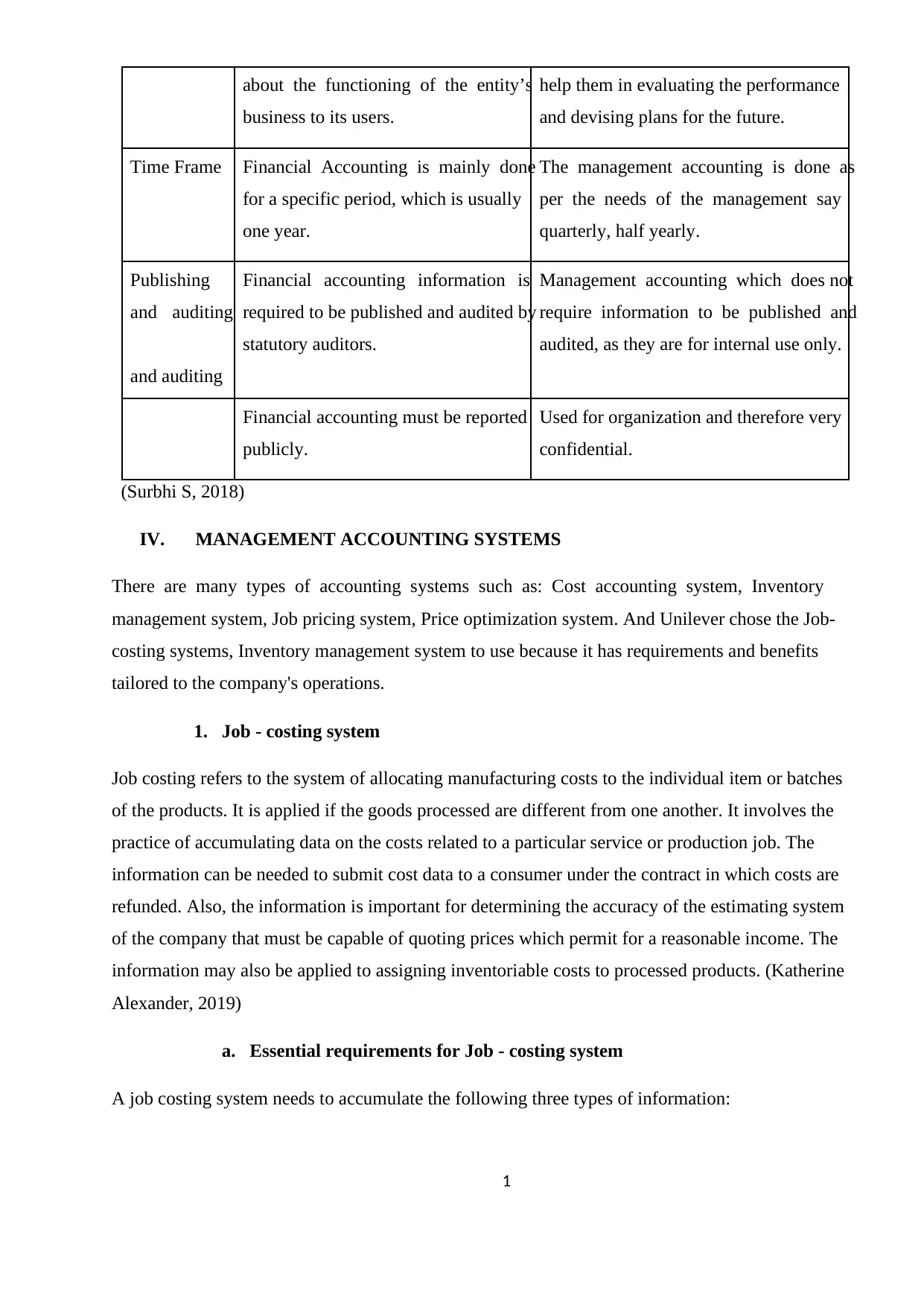
1
about the functioning of the entity’s
business to its users.
help them in evaluating the performance
and devising plans for the future.
Time Frame Financial Accounting is mainly done
for a specific period, which is usually
one year.
The management accounting is done as
per the needs of the management say
quarterly, half yearly.
Publishing
and auditing
and auditing
Financial accounting information is
required to be published and audited by
statutory auditors.
Management accounting which does not
require information to be published and
audited, as they are for internal use only.
Financial accounting must be reported
publicly.
Used for organization and therefore very
confidential.
(Surbhi S, 2018)
IV. MANAGEMENT ACCOUNTING SYSTEMS
There are many types of accounting systems such as: Cost accounting system, Inventory
management system, Job pricing system, Price optimization system. And Unilever chose the Job-
costing systems, Inventory management system to use because it has requirements and benefits
tailored to the company's operations.
1. Job - costing system
Job costing refers to the system of allocating manufacturing costs to the individual item or batches
of the products. It is applied if the goods processed are different from one another. It involves the
practice of accumulating data on the costs related to a particular service or production job. The
information can be needed to submit cost data to a consumer under the contract in which costs are
refunded. Also, the information is important for determining the accuracy of the estimating system
of the company that must be capable of quoting prices which permit for a reasonable income. The
information may also be applied to assigning inventoriable costs to processed products. (Katherine
Alexander, 2019)
a. Essential requirements for Job - costing system
A job costing system needs to accumulate the following three types of information:
about the functioning of the entity’s
business to its users.
help them in evaluating the performance
and devising plans for the future.
Time Frame Financial Accounting is mainly done
for a specific period, which is usually
one year.
The management accounting is done as
per the needs of the management say
quarterly, half yearly.
Publishing
and auditing
and auditing
Financial accounting information is
required to be published and audited by
statutory auditors.
Management accounting which does not
require information to be published and
audited, as they are for internal use only.
Financial accounting must be reported
publicly.
Used for organization and therefore very
confidential.
(Surbhi S, 2018)
IV. MANAGEMENT ACCOUNTING SYSTEMS
There are many types of accounting systems such as: Cost accounting system, Inventory
management system, Job pricing system, Price optimization system. And Unilever chose the Job-
costing systems, Inventory management system to use because it has requirements and benefits
tailored to the company's operations.
1. Job - costing system
Job costing refers to the system of allocating manufacturing costs to the individual item or batches
of the products. It is applied if the goods processed are different from one another. It involves the
practice of accumulating data on the costs related to a particular service or production job. The
information can be needed to submit cost data to a consumer under the contract in which costs are
refunded. Also, the information is important for determining the accuracy of the estimating system
of the company that must be capable of quoting prices which permit for a reasonable income. The
information may also be applied to assigning inventoriable costs to processed products. (Katherine
Alexander, 2019)
a. Essential requirements for Job - costing system
A job costing system needs to accumulate the following three types of information:
Paraphrase This Document
Need a fresh take? Get an instant paraphrase of this document with our AI Paraphraser
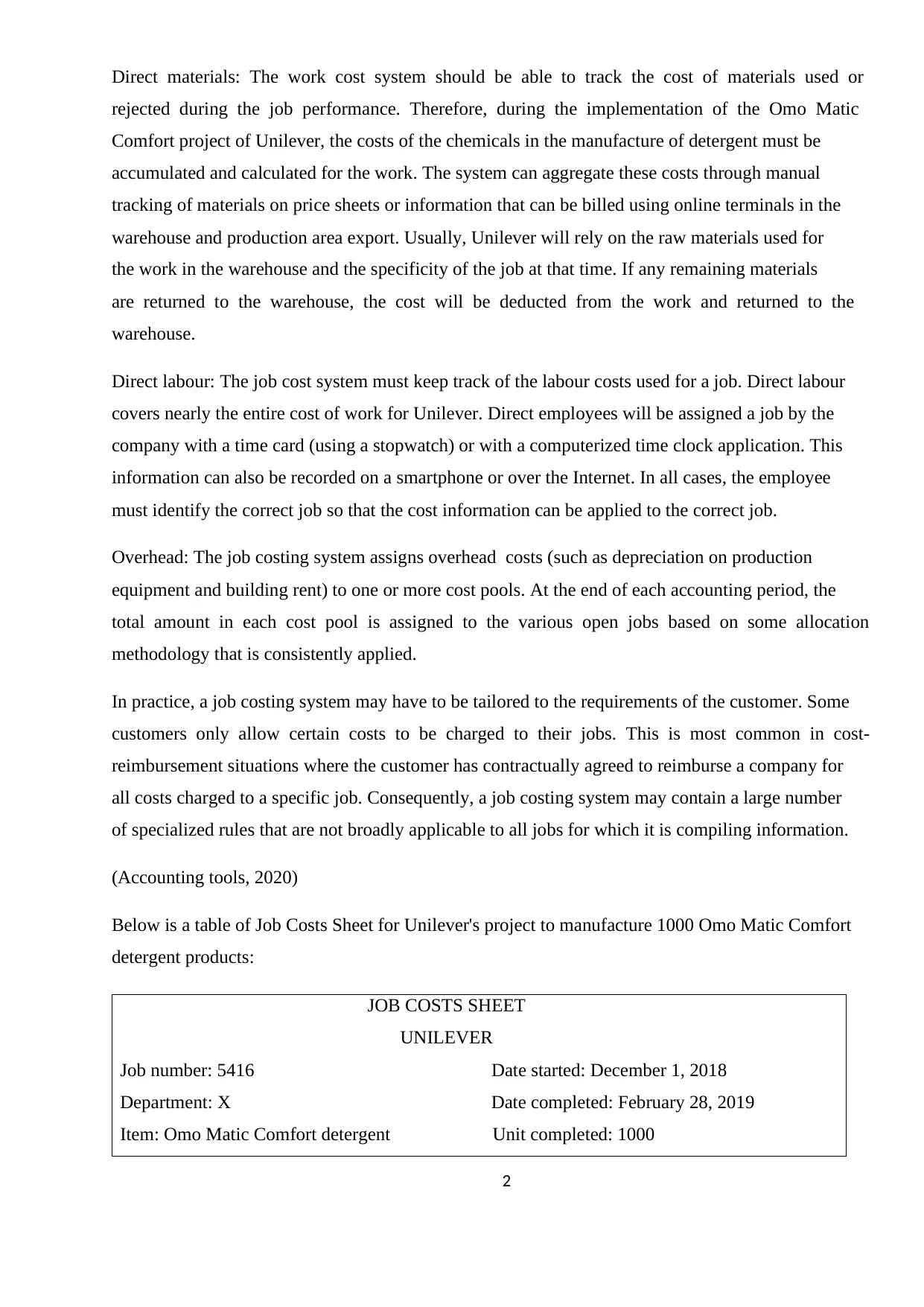
2
Direct materials: The work cost system should be able to track the cost of materials used or
rejected during the job performance. Therefore, during the implementation of the Omo Matic
Comfort project of Unilever, the costs of the chemicals in the manufacture of detergent must be
accumulated and calculated for the work. The system can aggregate these costs through manual
tracking of materials on price sheets or information that can be billed using online terminals in the
warehouse and production area export. Usually, Unilever will rely on the raw materials used for
the work in the warehouse and the specificity of the job at that time. If any remaining materials
are returned to the warehouse, the cost will be deducted from the work and returned to the
warehouse.
Direct labour: The job cost system must keep track of the labour costs used for a job. Direct labour
covers nearly the entire cost of work for Unilever. Direct employees will be assigned a job by the
company with a time card (using a stopwatch) or with a computerized time clock application. This
information can also be recorded on a smartphone or over the Internet. In all cases, the employee
must identify the correct job so that the cost information can be applied to the correct job.
Overhead: The job costing system assigns overhead costs (such as depreciation on production
equipment and building rent) to one or more cost pools. At the end of each accounting period, the
total amount in each cost pool is assigned to the various open jobs based on some allocation
methodology that is consistently applied.
In practice, a job costing system may have to be tailored to the requirements of the customer. Some
customers only allow certain costs to be charged to their jobs. This is most common in cost-
reimbursement situations where the customer has contractually agreed to reimburse a company for
all costs charged to a specific job. Consequently, a job costing system may contain a large number
of specialized rules that are not broadly applicable to all jobs for which it is compiling information.
(Accounting tools, 2020)
Below is a table of Job Costs Sheet for Unilever's project to manufacture 1000 Omo Matic Comfort
detergent products:
JOB COSTS SHEET
UNILEVER
Job number: 5416 Date started: December 1, 2018
Department: X Date completed: February 28, 2019
Item: Omo Matic Comfort detergent Unit completed: 1000
Direct materials: The work cost system should be able to track the cost of materials used or
rejected during the job performance. Therefore, during the implementation of the Omo Matic
Comfort project of Unilever, the costs of the chemicals in the manufacture of detergent must be
accumulated and calculated for the work. The system can aggregate these costs through manual
tracking of materials on price sheets or information that can be billed using online terminals in the
warehouse and production area export. Usually, Unilever will rely on the raw materials used for
the work in the warehouse and the specificity of the job at that time. If any remaining materials
are returned to the warehouse, the cost will be deducted from the work and returned to the
warehouse.
Direct labour: The job cost system must keep track of the labour costs used for a job. Direct labour
covers nearly the entire cost of work for Unilever. Direct employees will be assigned a job by the
company with a time card (using a stopwatch) or with a computerized time clock application. This
information can also be recorded on a smartphone or over the Internet. In all cases, the employee
must identify the correct job so that the cost information can be applied to the correct job.
Overhead: The job costing system assigns overhead costs (such as depreciation on production
equipment and building rent) to one or more cost pools. At the end of each accounting period, the
total amount in each cost pool is assigned to the various open jobs based on some allocation
methodology that is consistently applied.
In practice, a job costing system may have to be tailored to the requirements of the customer. Some
customers only allow certain costs to be charged to their jobs. This is most common in cost-
reimbursement situations where the customer has contractually agreed to reimburse a company for
all costs charged to a specific job. Consequently, a job costing system may contain a large number
of specialized rules that are not broadly applicable to all jobs for which it is compiling information.
(Accounting tools, 2020)
Below is a table of Job Costs Sheet for Unilever's project to manufacture 1000 Omo Matic Comfort
detergent products:
JOB COSTS SHEET
UNILEVER
Job number: 5416 Date started: December 1, 2018
Department: X Date completed: February 28, 2019
Item: Omo Matic Comfort detergent Unit completed: 1000
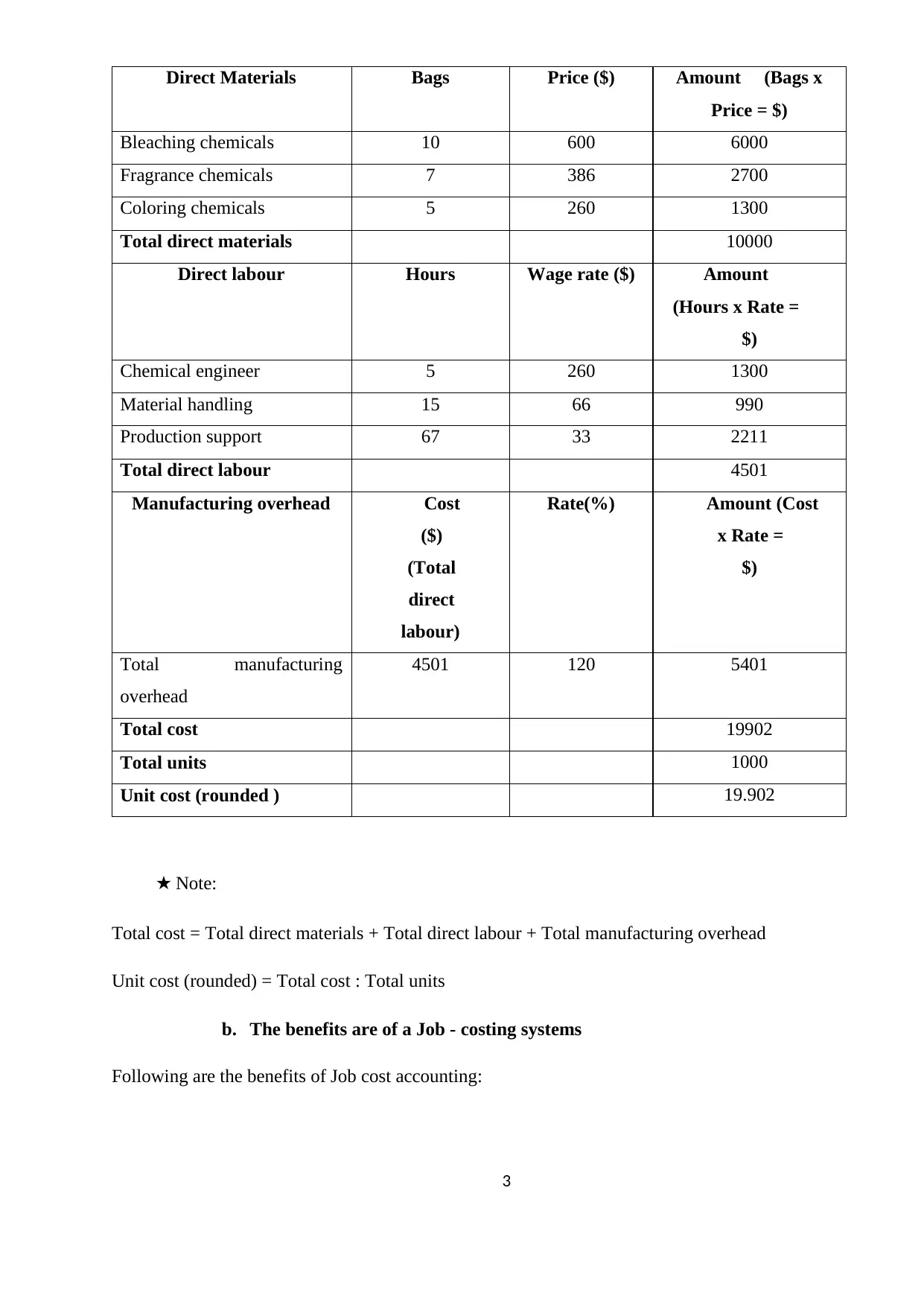
3
Direct Materials Bags Price ($) Amount (Bags x
Price = $)
Bleaching chemicals 10 600 6000
Fragrance chemicals 7 386 2700
Coloring chemicals 5 260 1300
Total direct materials 10000
Direct labour Hours Wage rate ($) Amount
(Hours x Rate =
$)
Chemical engineer 5 260 1300
Material handling 15 66 990
Production support 67 33 2211
Total direct labour 4501
Manufacturing overhead Cost
($)
(Total
direct
labour)
Rate(%) Amount (Cost
x Rate =
$)
Total manufacturing
overhead
4501 120 5401
Total cost 19902
Total units 1000
Unit cost (rounded ) 19.902
★ Note:
Total cost = Total direct materials + Total direct labour + Total manufacturing overhead
Unit cost (rounded) = Total cost : Total units
b. The benefits are of a Job - costing systems
Following are the benefits of Job cost accounting:
Direct Materials Bags Price ($) Amount (Bags x
Price = $)
Bleaching chemicals 10 600 6000
Fragrance chemicals 7 386 2700
Coloring chemicals 5 260 1300
Total direct materials 10000
Direct labour Hours Wage rate ($) Amount
(Hours x Rate =
$)
Chemical engineer 5 260 1300
Material handling 15 66 990
Production support 67 33 2211
Total direct labour 4501
Manufacturing overhead Cost
($)
(Total
direct
labour)
Rate(%) Amount (Cost
x Rate =
$)
Total manufacturing
overhead
4501 120 5401
Total cost 19902
Total units 1000
Unit cost (rounded ) 19.902
★ Note:
Total cost = Total direct materials + Total direct labour + Total manufacturing overhead
Unit cost (rounded) = Total cost : Total units
b. The benefits are of a Job - costing systems
Following are the benefits of Job cost accounting:
⊘ This is a preview!⊘
Do you want full access?
Subscribe today to unlock all pages.

Trusted by 1+ million students worldwide
1 out of 27
Related Documents
Your All-in-One AI-Powered Toolkit for Academic Success.
+13062052269
info@desklib.com
Available 24*7 on WhatsApp / Email
![[object Object]](/_next/static/media/star-bottom.7253800d.svg)
Unlock your academic potential
Copyright © 2020–2026 A2Z Services. All Rights Reserved. Developed and managed by ZUCOL.




